Overview
This article shines a light on effective strategies to enhance social skills for children with autism, highlighting the critical role of early intervention, role-playing, and the invaluable support of parents. It delves into various techniques, such as:
- Utilizing visual aids
- Fostering peer interactions
These techniques have been shown to significantly boost interpersonal abilities and emotional well-being in these children. By creating a nurturing environment, we can truly foster their social development. As you read on, consider how these strategies can be implemented in your own journey, and remember that your involvement is key to making a lasting difference.
Introduction
Nurturing social skills in children with autism is a vital yet complex journey. Early intervention stands as a cornerstone for success, offering families essential support. As they navigate this path, parents face the pressing challenge of discovering effective strategies that foster meaningful interactions and connections. This article delves into nine impactful approaches designed not only to empower children with autism but also to equip parents and caregivers with the necessary tools for supporting their development.
How can these strategies transform the social landscape for children with autism, paving the way for a brighter, more inclusive future?
About ASD Media: Empowering Parents with Resources for Social Skills Development
At ASD Media, we are deeply committed to enhancing the execution of ABA therapy, offering vital insights and strategies tailored for caregivers and professionals. Our resources aim to address the challenges families face, ultimately improving outcomes for individuals with autism and ADHD. By nurturing a supportive community, we empower parents to share their experiences and access the latest information on social development. This approach ensures that families have effective tools to help their children flourish, creating an environment where social skills can truly thrive.
Research highlights the importance of early intervention with ABA therapy, showing that it can lead to significant improvements in social abilities. This underscores the critical need for community support and resources to foster success. Alarmingly, nearly 60% of youth with autism experience bullying, which emphasizes the urgent necessity for effective social skills training and community programs that promote inclusion and understanding.
The demand for certified ABA therapists has skyrocketed by 5,852% from 2010 to 2021, reflecting the growing recognition of ABA therapy's significance. With the average age of diagnosis for youth in lower-income households being just 4.7 years, timely access to resources becomes essential. Disturbingly, almost 30% of U.S. youth with autism do not receive any behavioral or medication treatment, highlighting the pressing need for community initiatives that ensure families can access the support services they require.
As Dawson et al. articulate, early intervention with ABA therapy can lead to substantial improvements in developmental outcomes, reinforcing the value of the resources provided by ASD Media. Furthermore, with 74% of autistic students in the U.S. graduating with a diploma, it is clear that effective support and resources can have a profoundly positive impact on educational achievements. We invite you to join our community, share your experiences, and explore the resources available to help you and your family navigate this journey together.
Prioritize Early Intervention: Key to Successful Social Skills Training
Focusing on early intervention is essential for youth with autism, as it lays a strong foundation for effective skills training. Did you know that approximately 1 in 36 youths are diagnosed with autism? This statistic highlights the increasing prevalence of this condition and the urgent need for support. When children receive early assistance, they are significantly more likely to develop vital interpersonal skills. Research shows that early support can lead to an average IQ increase of 17 points, alongside improvements in daily living skills. Youngsters who receive this help demonstrate better communication and socialization outcomes compared to those who do not.
As parents, it’s crucial to seek out programs that emphasize interpersonal communication and peer interactions. This targeted support from a young age can make a world of difference in your child's development. The collaborative approach in these interventions, which involves active parental participation, fosters a nurturing environment, enhancing the likelihood of successful skills development.
Dr. Stephen Shore wisely states, 'If you’ve met one person with autism, you’ve met one person with autism.' This underscores the importance of tailored interventions that cater to each child's unique needs. By advocating for your child and exploring available resources, you can play a vital role in their journey towards growth and connection.
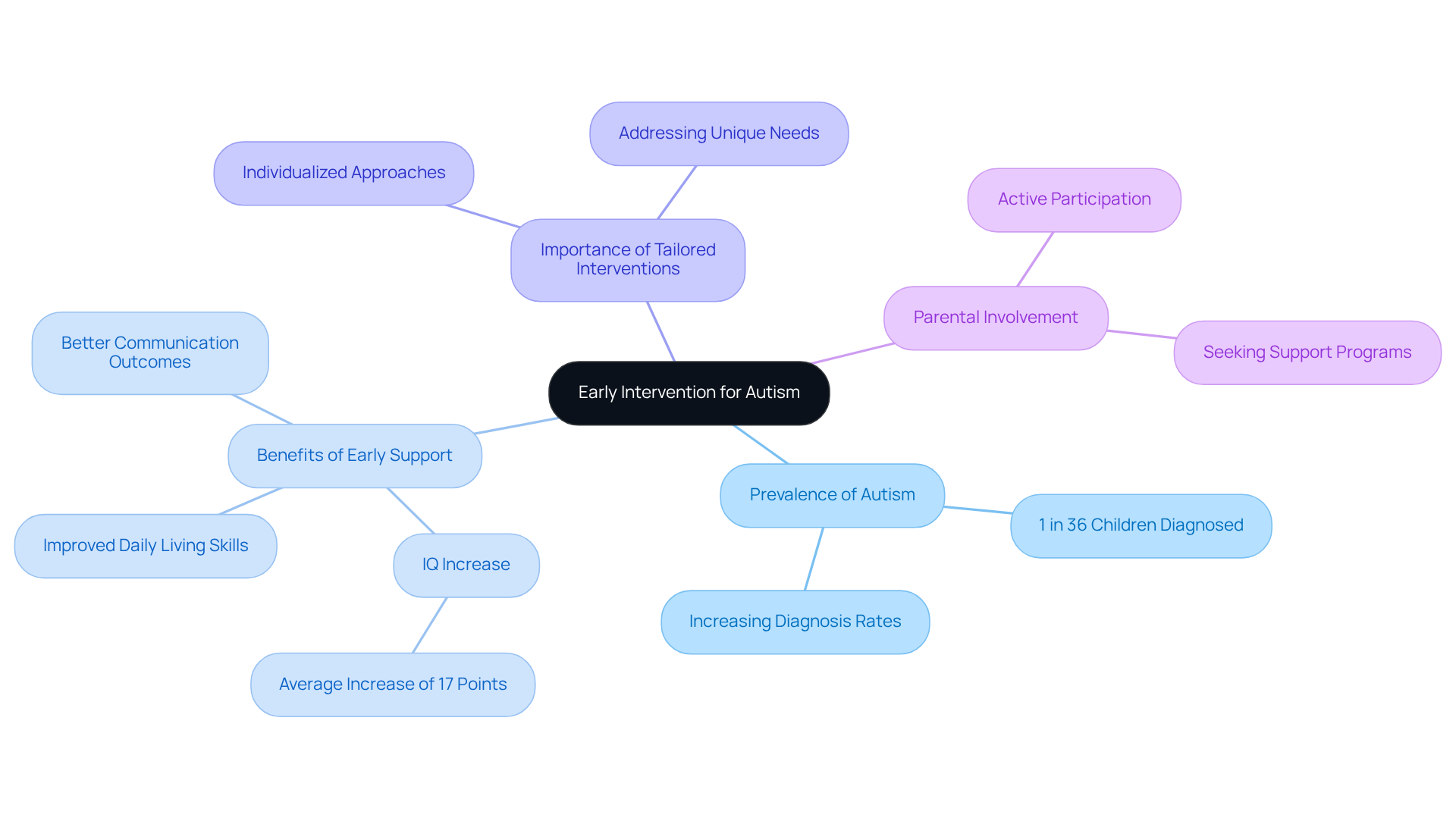
Utilize Visual Supports and Social Stories: Enhancing Understanding of Social Interactions
Visual aids, such as charts and picture schedules, can significantly enhance a child's understanding of social skills for kids with autism. These tools not only clarify complex situations but also provide a comforting structure that helps alleviate anxiety. Personal narratives, which recount specific interpersonal experiences, empower children to anticipate and navigate social cues with greater confidence.
By weaving these supportive strategies into everyday routines, parents can cultivate a nurturing environment that promotes social skills for kids with autism and reduces stress during social interactions. Imagine the difference it could make in your child's life—creating a space where they feel understood and equipped to engage with others.
Consider how you might incorporate these methods into your daily practices, fostering both growth and connection.
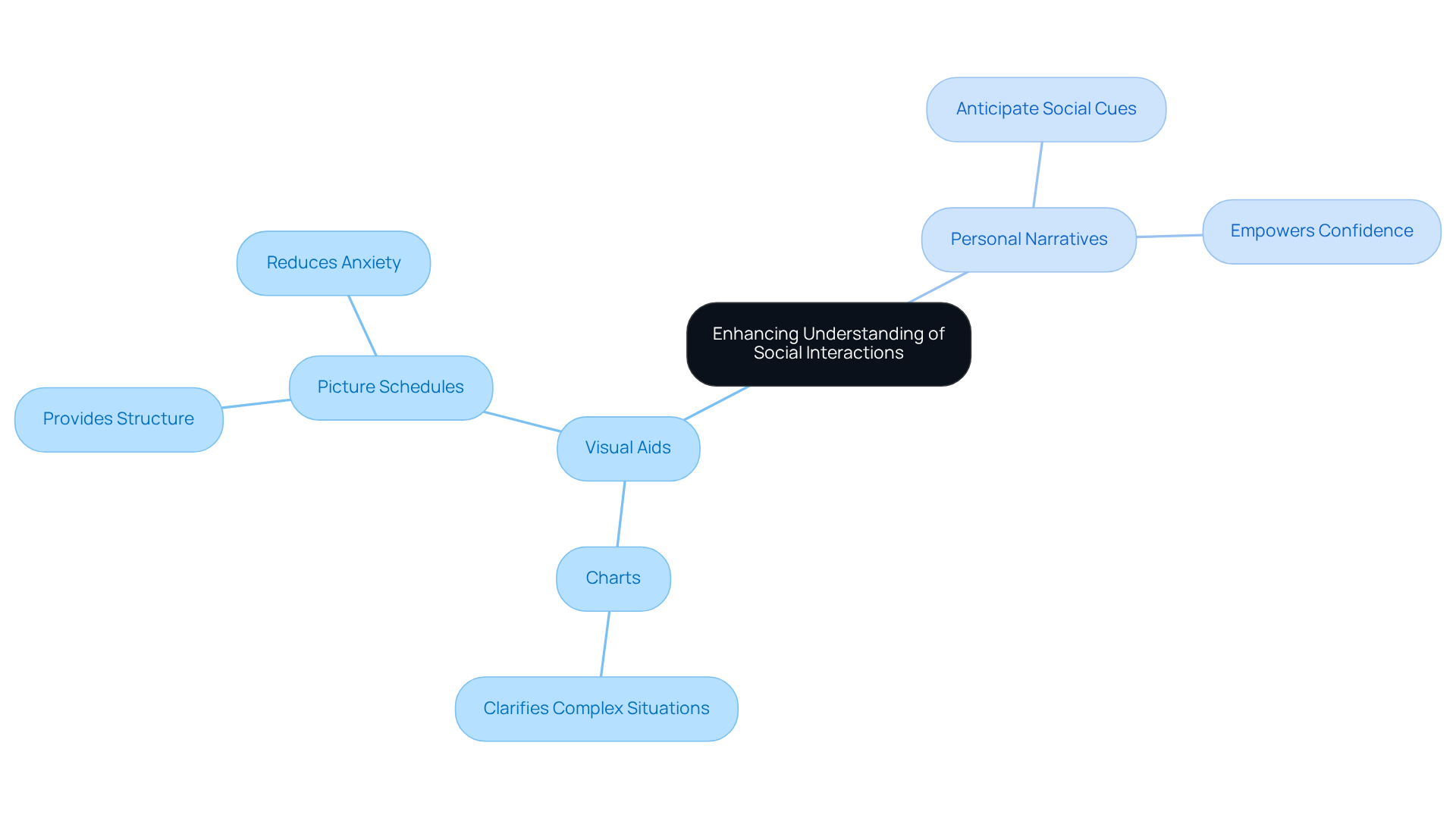
Incorporate Role-Playing: Practical Application of Social Skills
Integrating role-playing into training for social skills for kids with autism offers youngsters a secure and encouraging setting to rehearse interactions. Imagine your child greeting a friend, sharing toys, or resolving conflicts—these are real-life situations where role-playing can make a difference. Research shows that approximately 70% of young individuals engaged in consistent role-playing activities demonstrate improvements in behavior and enhance social skills for kids with autism. These exercises not only build confidence but also help children internalize appropriate responses and behaviors in various social contexts, which is essential for developing social skills for kids with autism.
To keep children engaged, effective role-playing scenarios should be brief, lasting around 3 to 5 minutes. Techniques like using visual supports and structured scripts can enhance understanding, making it easier for children to participate actively. Resources such as printable scripts and role-play cards cater to different age groups, providing practical tools for parents. Scheduling regular role-playing sessions multiple times a week is crucial for skill development.
After each role-play session, reflective discussions promote self-awareness and help young learners identify effective strategies, further enhancing their learning. By incorporating role-playing into everyday activities, you can significantly improve your child's social skills for kids with autism and emotional strength. What role-play scenarios have you tried with your child? Share your experiences and insights—together, we can foster a nurturing environment for our children to thrive.
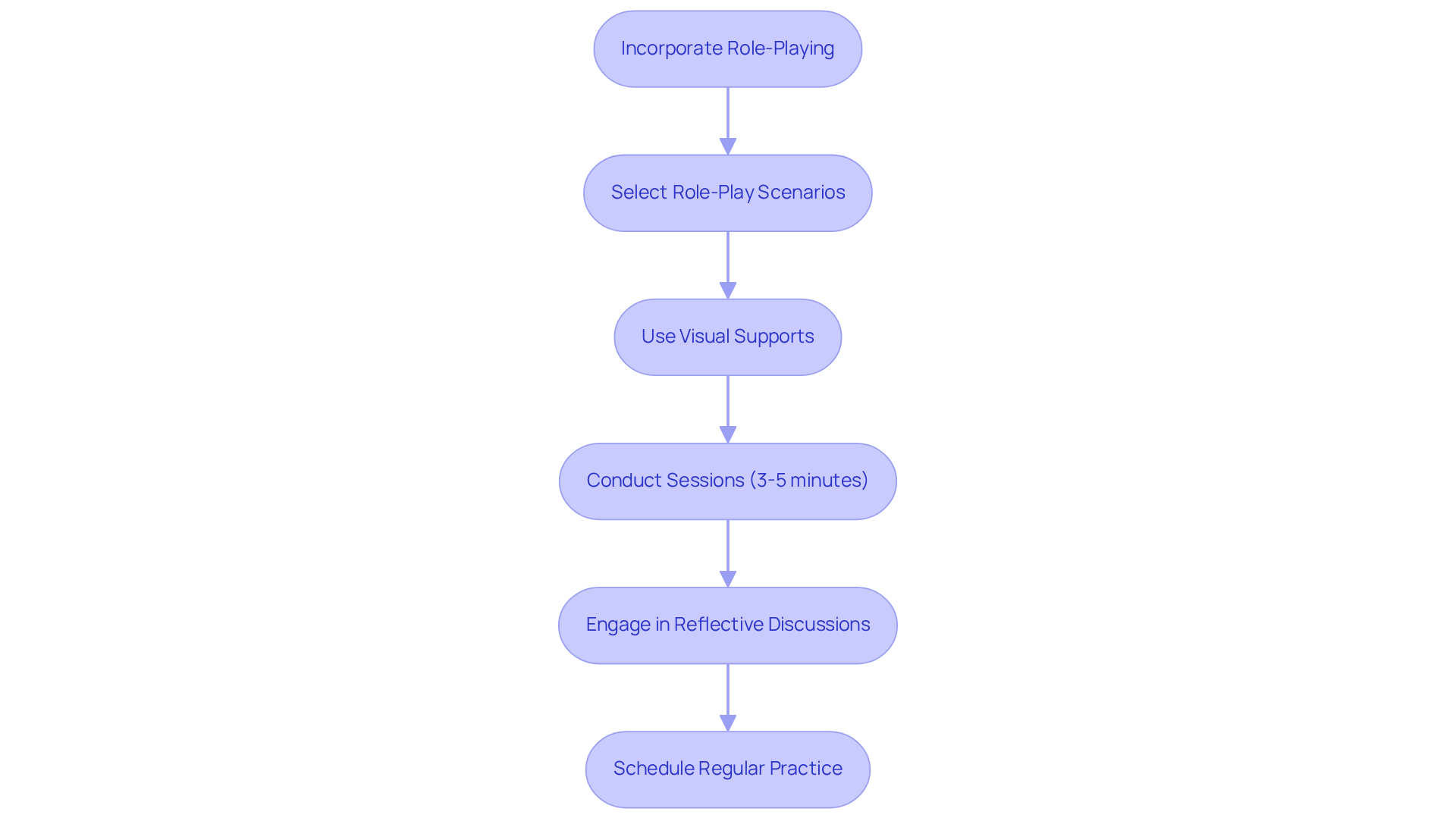
Celebrate Small Wins: Encouraging Progress in Social Skills
Recognizing minor achievements in the development of social skills for kids with autism is essential for encouraging them to continue their efforts. When we acknowledge these achievements—whether it's successfully initiating a conversation or sharing a toy—we reinforce positive behavior and inspire further progress. Parents can enhance this process by employing various strategies, such as:
- Verbal praise
- Tangible rewards
- Engaging in special activities that celebrate these milestones
Research shows that acknowledging small victories can significantly improve mood and self-esteem, fostering a growth mindset that is crucial for long-term development.
For instance, keeping a 'ta-da!' list can serve as a visual reminder of achievements, helping children observe their growth over time. Psychologists emphasize that recognizing these minor accomplishments not only boosts confidence but also fosters resilience, enabling children to tackle greater challenges in their interactions. Each time we celebrate a victory, our brains release dopamine, elevating our mood. By nurturing an environment that appreciates gradual improvement, guardians can effectively motivate their children to cultivate social skills for kids with autism and navigate their communities with increased assurance.
Collaborate with Educators and Therapists: Building a Supportive Network
Building a cooperative connection with educators and therapists is essential for effective training of social skills for kids with autism. Regular communication between parents and teachers fosters a unified approach, allowing for the sharing of insights and strategies that have proven successful both at home and in school.
Research indicates that active parental participation can lead to a 10-15% increase in standardized test scores, underscoring the broader impact of cooperation on academic and interpersonal outcomes. Moreover, therapists emphasize that consistent support from both home and school settings significantly enhances social skills for kids with autism.
As expert José Fernández Cerero notes, 'Active parental involvement greatly enhances students’ academic performance and emotional well-being.' By collaborating, guardians and educators can create a supportive network that not only addresses the unique needs of each student but also bolsters their overall emotional health and motivation.
This partnership is vital for navigating the complexities of autism support, ensuring that children receive the comprehensive care they need to develop social skills for kids with autism. To facilitate this collaboration, guardians are encouraged to:
- Attend conferences
- Stay informed about the curriculum
- Leverage technology for effective communication with educators
However, it's important to recognize the challenges parents may encounter, such as limited resources and ineffective communication with schools, which can hinder their involvement. Addressing these challenges is crucial for nurturing a successful partnership.
Foster Empathy: A Vital Component of Social Skills Training
Nurturing empathy in youngsters with autism is essential for enhancing their social skills for kids with autism and improving their overall quality of life. Empathy empowers young individuals to relate to others, understand their emotions, and respond appropriately in social situations. Parents can effectively teach empathy through various strategies, such as:
- Openly discussing emotions
- Engaging in role-playing scenarios with puppets or stuffed animals
- Encouraging perspective-taking
For instance, involving children in conversations about different emotional experiences helps them identify and name feelings, which is crucial for cultivating empathy.
Role-playing can be particularly beneficial, allowing children to practice interactions in a safe environment. This approach not only aids them in grasping how to respond to others' emotions but also reinforces the significance of empathetic behavior. Additionally, incorporating tools like stories that provide step-by-step guidance on appropriate behavior can help children anticipate and react to cues from others, enhancing their ability to navigate complex interactions.
Research indicates that empathy training can significantly improve social skills for kids with autism. Programs like PEERS® have shown positive outcomes, including:
- Increased interpersonal engagement
- A better understanding of social skills for kids with autism
- Improved friendship quality
By creating opportunities for practice and modeling empathetic behavior, parents can support their children in developing the essential skills for meaningful interpersonal connections. Ultimately, teaching empathy not only enriches children's experiences but also fosters a sense of belonging and acceptance within their communities.
Encourage Peer Interactions: Building Friendships for Social Growth
Encouraging peer interactions is vital for fostering social skills for kids with autism and supporting their developmental growth. As caring parents, you can create meaningful opportunities through:
- Playdates
- Group activities
- Community events
These exchanges allow youngsters to practice social skills for kids with autism in real-life situations, helping them to form friendships and navigate social interactions more effectively. Research shows that effective playdate programs in organized settings can significantly enhance interpersonal abilities, enabling children to learn from their peers. As Dr. O. Ivar Lovaas wisely stated, 'If they can’t learn the way we teach, we teach the way they learn,' highlighting the importance of tailored approaches in social environments.
Furthermore, with 1 in 36 young individuals in the United States diagnosed with autism, the need for effective interpersonal development is more pressing than ever. The benefits of these interactions extend beyond immediate socialization; they empower individuals with autism to develop social skills for kids with autism, which are essential for building confidence and resilience—key components for their overall growth.
By prioritizing peer interactions, caregivers can play a pivotal role in their children's journey toward enhancing social skills for kids with autism and forming meaningful connections. To initiate playdates, reach out to other families, propose organized activities that align with your children's interests, and create a welcoming atmosphere for interaction.
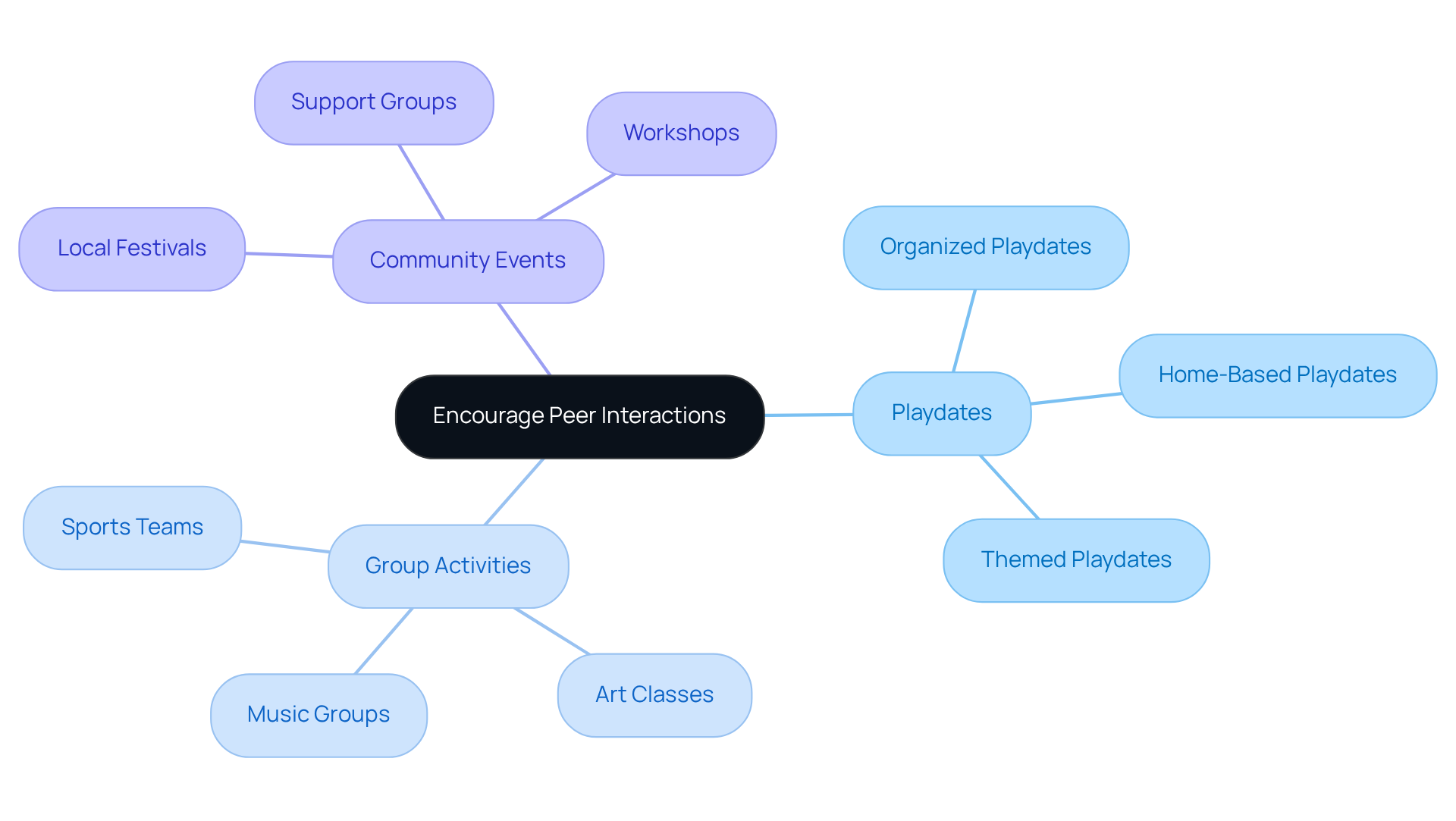
Engage Parents: Their Role in Supporting Social Skills Development
Involving guardians in the development of interpersonal abilities is crucial for reinforcing the skills that children with autism acquire. When caregivers actively participate in therapy sessions, they have the opportunity to witness techniques firsthand, empowering them to practice these skills effectively at home. Research indicates that children whose guardians engage in their therapy tend to show quicker progress and improved interpersonal interactions. Furthermore, active parental involvement not only boosts students' academic performance but also enhances their emotional well-being, making it an essential component of effective therapy.
By providing feedback to therapists, caregivers can help tailor interventions to meet their child's unique needs, fostering a collaborative environment that promotes learning. This partnership enriches the educational experience while cultivating a nurturing atmosphere that encourages ongoing social growth. Telehealth services are transforming parental engagement, opening up new pathways for involvement and communication. It's also vital to build trust and maintain open lines of communication between caregivers and therapists to coordinate efforts effectively, ultimately improving the outcomes of autism therapy.
However, many guardians face obstacles such as limited school resources and communication barriers that can hinder their involvement. To overcome these challenges, parental education programs can play a pivotal role in equipping parents with effective strategies for engagement, further supporting their child's development. Together, we can create a supportive network that empowers families and fosters growth for children with autism.
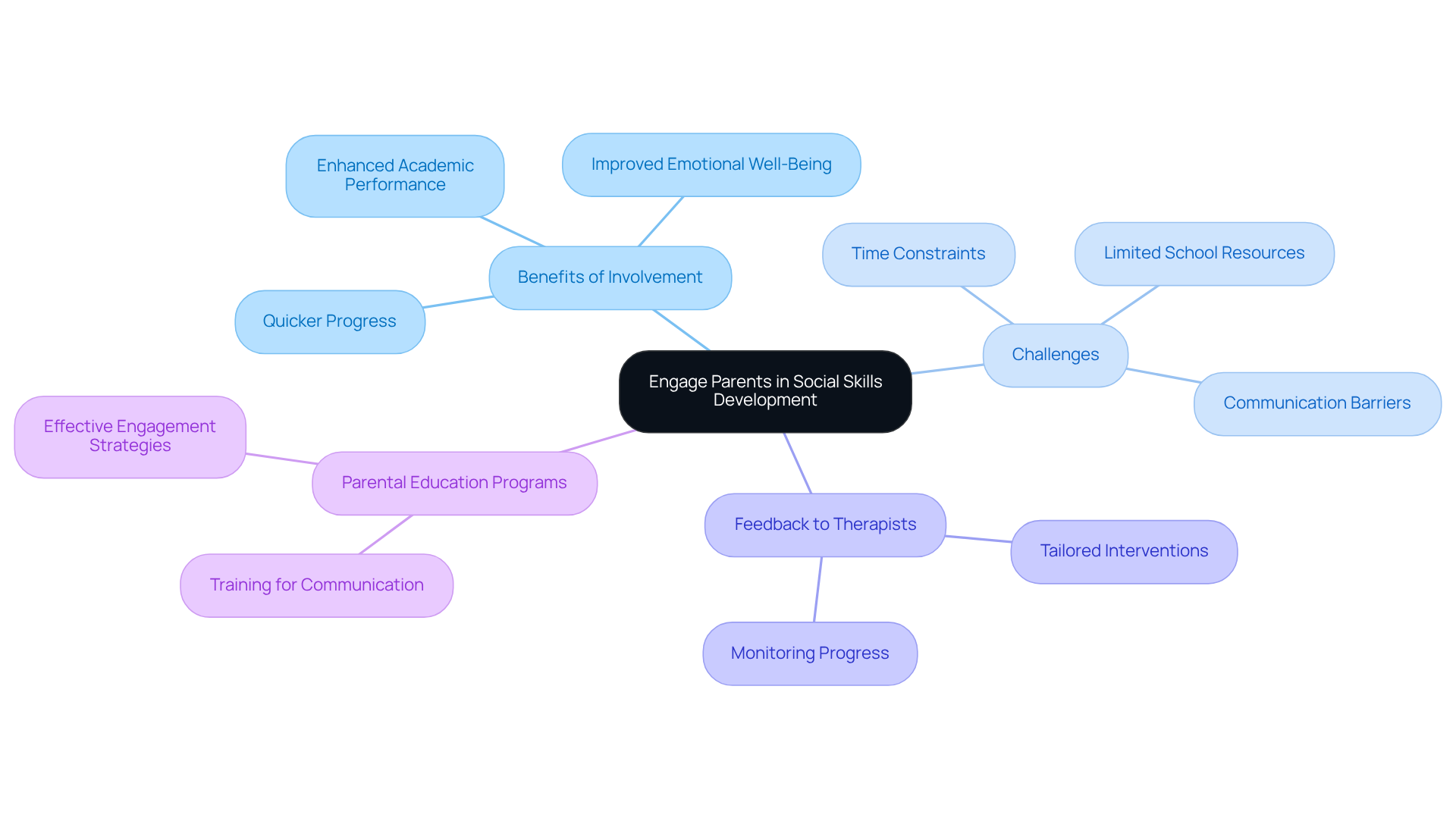
Conclusion
Nurturing social skills in children with autism is a multifaceted journey that requires dedication, resources, and effective strategies. By focusing on early intervention, parents can lay a strong foundation for their child's social development. This proactive approach not only enhances interpersonal skills but also empowers children to engage confidently with their peers, ultimately fostering a more inclusive environment.
The article outlines nine effective strategies that emphasize the importance of:
- Early support
- Visual aids
- Role-playing
- Celebrating small victories
Each method serves as a building block in the development of social skills, highlighting the critical role of parental involvement and collaboration with educators and therapists. By implementing these techniques, caregivers can create a nurturing environment that promotes growth and connection, ensuring their children can navigate social interactions with greater ease.
Reflecting on these insights, it becomes clear that the journey toward improving social skills for children with autism is not one that should be undertaken alone. Engaging with community resources, sharing experiences, and advocating for tailored interventions can significantly enhance the outcomes for children and their families. By embracing these strategies and fostering a supportive network, parents can help their children thrive socially, paving the way for a brighter, more connected future.
Frequently Asked Questions
What is the mission of ASD Media?
ASD Media is committed to enhancing the execution of ABA therapy by providing vital insights and strategies for caregivers and professionals, helping families improve outcomes for individuals with autism and ADHD.
Why is early intervention important for youth with autism?
Early intervention is crucial as it lays a strong foundation for effective skills training, significantly increasing the likelihood of developing vital interpersonal skills and improving communication and socialization outcomes.
What statistics highlight the prevalence of autism?
Approximately 1 in 36 youths are diagnosed with autism, indicating an increasing prevalence and the urgent need for support.
How does early support impact a child's development?
Early support can lead to an average IQ increase of 17 points and improvements in daily living skills, resulting in better communication and socialization outcomes.
What role do parents play in their child's development?
Parents are encouraged to seek out programs that emphasize interpersonal communication and peer interactions, as their active participation fosters a nurturing environment for successful skills development.
What are visual supports and how do they help children with autism?
Visual supports, such as charts and picture schedules, enhance a child's understanding of social skills by clarifying complex situations and providing structure, which helps alleviate anxiety.
What are social stories and their benefits?
Social stories are personal narratives that recount specific interpersonal experiences, empowering children to anticipate and navigate social cues with greater confidence.
How can parents incorporate supportive strategies into daily routines?
Parents can weave visual supports and social stories into everyday practices to cultivate a nurturing environment that promotes social skills and reduces stress during social interactions.
What is the significance of community support for families with autism?
Community support is essential as it provides resources and programs that ensure families can access the necessary support services, particularly given that nearly 30% of U.S. youth with autism do not receive any behavioral or medication treatment.
How does ASD Media encourage community involvement?
ASD Media invites families to join their community, share experiences, and explore available resources to help navigate the journey of social skills development together.




